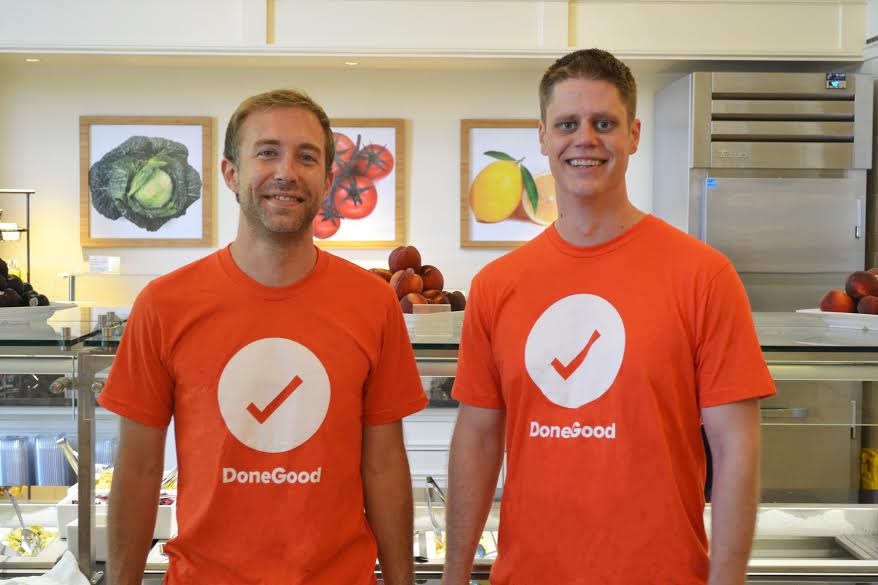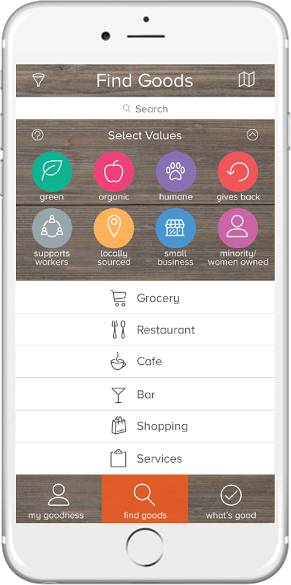DoneGood Helps You Find Socially Responsible Boston Businesses

Cullen Schwarz and Scott Jacobsen | Image Provided
Scott Jacobsen and Cullen Schwarz are convinced the biggest impact you can make is with what’s already in your back pocket.
“It’s your wallet,” Schwarz says. “As people who buy things, we can get whatever we want out of this economy.”
To test their theory, the duo launched DoneGood, an app that lets users easily find socially responsible businesses in the Boston area. And after a successful, nearly three-month run in the App Store, the startup is launching Tuesday on Android.
“We want DoneGood to be the place you go if you want to integrate your values into your daily life,” Schwarz says. “Your one-stop shop in doing good in your daily world.”
Jacobsen, a recent graduate of the Harvard Kennedy School, understands changing routine. He stopped visiting his favorite sandwich shop in Washington, D.C., because the owner refused to add a recycling bin despite serving the food in recyclable plastic containers. Coincidentally, it was in the Capitol that Jacobsen met Schwarz, a former press secretary for the U.S. Department of Agriculture.
The two shared similar values, and used those values to influence their purchasing decisions. But finding companies that were eco-friendly, strove to pay their workers higher wages, or only used locally-sourced ingredients wasn’t easy.
“There were a lot of businesses out there doing good across a variety of levels and a variety of values,” Jacobsen says, “but no one was putting it in one place.”

Image Provided
DoneGood is changing that by allowing users to select their values, such as “green,” “organic,” or “humane,” and filter businesses by whether they match those criteria. Each business has been certified by trusted organizations dedicated to rating social impact, such as the Green Restaurant Association or Restaurant Opportunities Center United. If users disagree with a company’s rating, however, they can rank the company themselves.
“If enough folks disagree, the business can lose the rating,” Schwarz explains. “Why is Wikipedia useful? Because, on the whole, the crowd tends to get it right. This is much more information at your fingertips than you ever had before.”
For socially-minded business owners, the app is providing a way for them to communicate how they’re doing good directly to the people who care. Take Cambridge’s The Just Crust, which Jacobsen notes makes its pizza entirely from local ingredients and pays its workers $15 per hour. With DoneGood, they can share that story with others who want to have a positive social impact.
Jacobsen and Schwarz also hope to create cross-pollination by inspiring users already, say, interested in an organic lifestyle to scan businesses that are minority- or woman-owned.
“We hope through DoneGood, all these movements can strengthen each other,” Schwarz says.
The startup is now experimenting with other ways to help strengthen featured movements. The founders have received “a ton of great feedback” on features users want to see added, including highlighting events or community organizations that promote social good. DoneGood served in August as the official app of the Boston GreenFest, and will be collaborating with City Awake on its Social Impact Festival, taking place from November 5th through the 14th.
The startup is currently based out of the Harvard Innovation Lab with MIT student Garrett Parrish, DoneGood’s chief technology officer, who helped develop the app. While there, they are working with fellow startups like Agenda28, a design studio specialized in social impact.
“One of the things we love about Boston and Cambridge is that there are young, talented people who are not just interested in making the next selfie stick,” Schwarz says. “Garrett wanted to create something of purpose … and over 30 percent of the teams located at the i-lab have a focus on social impact.”
Now, it’s up to the residents of Boston and Cambridge to take the next step and use their purchasing power more wisely.
“The fact [is] technology has done so much—hailing a cab, finding the right person to go on a date with,” Jacobsen says, “In terms of social impact, we’re just starting to scratch the surface.”


